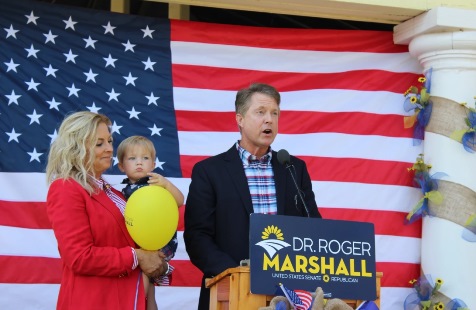
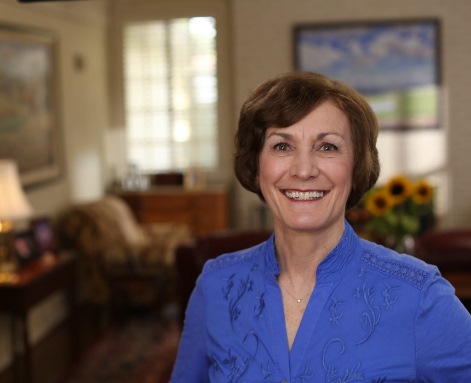
U.S. Rep. Roger Marshall of western Kansas will face Democrat Barbara Bollier in November. The other congressional races also took shape, with U.S. Rep. Steve Watkins losing his bid for re-election in the 2nd District to the state treasurer.
by Jim McLean, Stephen Koranda, Corinne Boyer and Aviva Okeson-Haberman, Kansas News Service
Topeka, Kansas — Kansas’ biggest primary race was one of the first to be decided Tuesday: U.S. Rep. Roger Marshall secured the Republican nomination for U.S. Senate, and will face Democratic nominee Barbara Bollier in the November general election.
Officials had cautioned that the record numbers of mail-in advanced ballots — a sign of the times in a pandemic — could lead to delayed results. But by 10:30 p.m., all of the major contests were over.
Marshall’s victory ended former Kansas Secretary of State Kris Kobach’s latest quest for higher office; the race saw millions of dollars in outside spending in the last month.
In the 2nd Congressional District, incumbent Republican Rep. Steve Watkins, who was charged with felonies in July related to voting issues, is out. Kansas Treasurer Jake LaTurner will take on Topeka Mayor Michelle De La Isla in November.
Former Cerner executive Amanda Adkins was declared the winner in eastern Kansas’ packed 3rd Congressional District GOP race and next faces U.S. Rep. Sharice Davids.
And former Lt. Gov. Tracey Mann, a Republican, will face Democrat Kali Barnett in the 1st Congressional District.
The Kansas Secretary of State’s office sent out 315,000-plus ballots. All mail-in advanced voting ballots had to be postmarked by Tuesday and must arrive at a post office by Friday. As of Tuesday evening, about 99,000 hadn’t yet been returned. The office said no major voting issues were reported.
U.S. Senate
The seat being vacated by retiring U.S. Sen. Pat Roberts is considered one that could tip the balance of the Senate in Democrats’ favor come November.
Endorsements from several establishment Republicans, including Roberts and key business, agriculture and anti-abortion groups, proved pivotal for Marshall — as did Senate Majority Leader Mitch McConnell’s intervention in the final weeks of the campaign.
Marshall held a 14 percentage point lead over Kobach with most precincts reporting. The retired doctor from Great Bend who has served two terms in the House representing the 1st District, also beat Kansas City-area businessman Bob Hamilton by about 21 percentage points.
Marshall declared victory at about 9 p.m. in a speech.
“What I would pledge to you as your senator is I’m going to do everything in my power to keep you, your family, your loved ones safe and get you safely through this virus,” he said. “We’re going to do it together, and we’re going to do it with American ingenuity.”
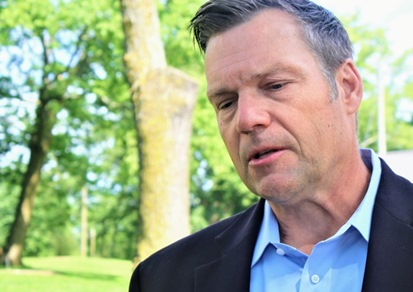
After failing to convince U.S. Secretary of State Mike Pompeo to run for the seat, McConnell got behind Marshall in an effort to keep the nomination from Kobach, who lost the 2018 Kansas governor’s race.
McConnell’s Senate Leadership Fund was one of several political action committees that spent a combined $11 million in the primary, most of it in the final month.
Marshall was the target of a barrage of negative ads produced by Democrats hoping to steer the nomination to Kobach. He also fended off a late surge from Bob Hamilton, a political newcomer who bankrolled his “outsider” campaign with money from the sale of his Johnson County plumbing business.
A Democrat hasn’t won a U.S. Senate seat in Kansas since 1932, and Marshall told the Kansas News Service on Tuesday night that Democrats’ tactics in the primary won’t work in the general.
“They may want to take their money to another state because Kansas is not purple,” he said. “We are deep, deep, deep ruby red like the ruby red slippers of The Wizard of Oz.”
Marshall’s opponent in the general election, Bollier, is a state senator from the Kansas City suburbs who switched parties in 2018. Already, she has raised more than $8 million — more than Marshall, Kobach and Hamilton combined did in the primary.
In a speech Tuesday night, Bollier called the GOP primary “a contest for unwavering support of a political party, rather than a thoughtful discussion about what Kansas needs to beat this (coronavirus) and dig out of this recession.”
Republican Jason Dexter, 80, voted in-person in Lecompton, where Kobach also did. He farms nearby, and voted for Kobach. When asked about Marshall, he said “I just don’t care for him somehow. It’s just a personal thing.”
Another Republican voter, Keith Noe, used to be a police officer in the Los Angeles area but moved back to the family farm near Lecompton. The 80-year-old also voted for Kobach because he likes his efforts to crack down on illegal immigration and voter fraud. The latter, he said, isn’t a huge problem in Kansas but is in places like California.
1st Congressional District
In the wake of a large primary for Kansas’ 1st Congressional District, two are left standing: Democrat Kali Barnett vs. Republican Tracey Mann.
The two will square off in the general election on Nov. 3 to replace U.S. Rep. Roger Marshall, who is seeking Pat Roberts’ U.S. Senate seat.
Agriculture and ag business drive the economy in the Big 1st, a massive district that encompasses towns and farm land east of Manhattan, south to Hutchinson and east to the Colorado border. Both Mann and Barnett have an interest in joining the House Agriculture Committee.
Barnett is a music teacher who grew up near Garden City on a farm, which her family lost when she was in high school. She said her inspiration to run for office came in 2018, when there were massive teacher strikes nationwide and when a record number of women were elected to Congress.
She said Tuesday night that she’ll be looking to “build a bridge and unite all the districts, constituents and be a voice for the change and the new leadership that I know the 1st District is seeking.”
Barnett supports universal health care — including eye care, dental care and mental health. She also wants to see a path to citizenship for people who’ve been in the U.S. for a long time and wants to work with farmers and ranchers on policies that will help them and reduce carbon emissions.
Mann grew up in rural Gove and Quinter counties where his family has farmed for more than a century. Mann, who now lives in Salina, studied agricultural economics at Kansas State University and is a realtor.
The victory was a surprise, Mann told the Kansas News Service, saying he was at home when the results came in but did “an impromptu little rally out of a hotel … here in Salina.” He also said he was “really encouraged and grateful for the votes of so many people from the Big First.”
Mann previously said he wants to bring “Kansas conservative values and to advocate for agriculture” in Congress. He supports Trump’s border wall and legal immigration. He doesn’t approve of the health care law and said rural Kansas needs more doctors.
2nd Congressional District
State Treasurer Jake LaTurner held a 15 percentage point lead over Rep. Steve Watkins at 9:45 p.m. Tuesday, with more than half of precincts reporting. It was a major loss for the first-term incumbent, and comes less than a month after criminal charges were filed against Watkins related to voter registration.
“Voters want someone that is going to be consistent representing them,” LaTurner told TV station KSNT on Tuesday night. “They want someone that can keep this seat in Republican hands, and I think they spoke with a loud voice saying that tonight.”
LaTurner entered the race last September and already had the backing of some establishment Republicans, like former Gov. Jeff Colyer. But the race took on more significance last month when the Shawnee County district attorney charged Watkins with three felonies related to registering to vote in 2019 using a UPS store in Topeka as his address.
LaTurner worked to capitalize on that, attracting more endorsements from Kansas 4th District Congressman Ron Estes and the well-known anti-abortion group Kansans for Life.
Watkins also fought back, calling the charges politically motivated and arguing the prosecutor, Michael Kagay, and LaTurner were connected because they had both hired a well-known consulting firm. Both LaTurner and the DA’s office have denied there’s any connection, and the website for the group, Singularis, says it’s served “hundreds” of candidates.
Watkins, who has filed to have Kagay disqualified in the case, told media outlets on Tuesday night that he was “very, very grateful for my campaign.“We had a good run.”
He also wished La Turner well as he headed into the general election.
“I personally would like to be a part of Republican unity and success this November,” said Watkins, who didn’t reveal what might come next for him. “I’ll continue to work to the best of my ability until the very last day that I serve.”
Dennis Taylor, who previously headed Kansas state agencies and also worked as an adviser to the U.S. State Department, stayed out of the fray before and after the charges. He focused his campaign on the need for a stronger coronavirus response and his experience in government.
On the Democratic side, Topeka Mayor Michelle De La Isla easily defeated James Windholz.
De La Isla said she’ll continue to focus her campaign on health care and protecting the Affordable Health Care Act. That has allowed states to expand health care coverage through the Medicaid program, with the assistance of federal money. Expansion has been hotly debated for years in Kansas.
“The issue of expansion is at the state level,” De La Isla said in an interview. “However, what is not is safeguarding those (federal) dollars.”
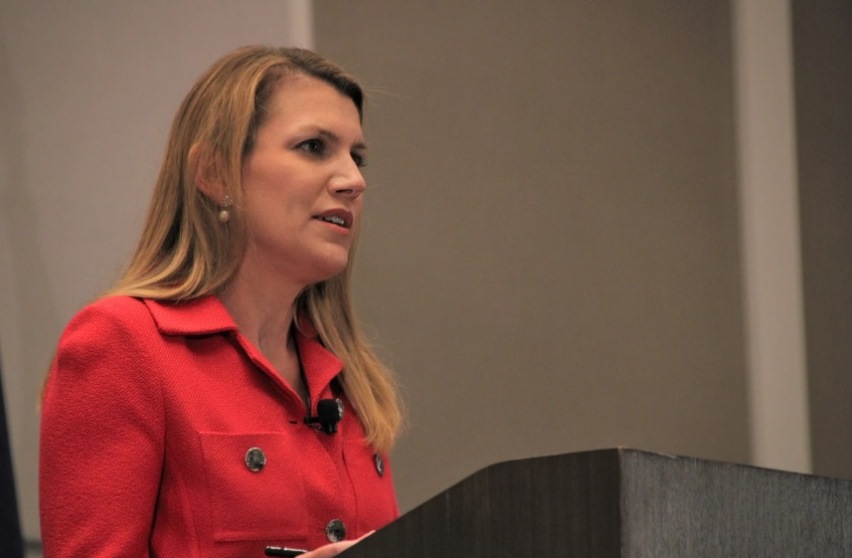
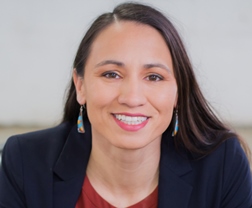
3rd Congressional District
Amanda Adkins won a crowded Republican primary for Kansas’ 3rd Congressional District. With about 88 percent of precincts reporting at 10 p.m., Adkins was ahead of her opponents by at least eight percentage points.
Adkins will face off against Democratic U.S. Rep. Sharice Davids in November in the district that encompasses Johnson and Wyandotte counties and a slice of Miami County. Davids flipped the 3rd in 2018 and has a sizable fundraising advantage.
Adkins challenged Davids to three debates: “One in each of our counties … Because the people of Wyandotte, Johnson and Miami county all deserve our time.”
Adkins is a former Cerner vice president and led the state Republican Party for several years. She outraised the rest of the GOP field, and emphasized her experience in health care and business on the campaign trail.
The district leans Democratic, according to the Cook Political Report. If Republicans want to recapture the district, they’ll have to win over suburban women. Adkins said her focus on economic recovery will appeal to this voting bloc.
In a sign of Davids’ strategy in November, the Democrat criticized Adkins on Tuesday night for her ties to former Kansas Gov. Sam Brownback.
“I’m confident that Kansans will vote to continue the progress we’ve made together, and reject Sam Brownback adviser Amanda Adkins’ plan to double down on the failures of the Brownback administration that gutted funding for our public schools and decimated our economy,” she said.
Weir issued a statement after coming in second in the primary.
“As I’ve said from the beginning of this race, the most important thing for the party is that we have a candidate that can defeat Sharice Davids in November,” she said, adding, “I look forward to working to help make that happen.”
4th Congressional District
This seat will be decided in November, pitting U.S. Rep. Ron Estes against Democrat Laura Lombard.
How the day of voting went
Ellis County Clerk Donna J. Maskus said about a week before the election that her county had received more than 2,500 advanced ballots, noting: “I’ve been here 41 years in this office and I’ve never seen the likes, so it’s exciting to see.”
Voters who chose to cast a ballot in person on Tuesday in Wichita, Topeka and Lecompton came away saying the process was smooth and that they felt safe. Election officials had done a lot to keep voters distanced and the amount of contact with others to a minimum.
At the Lake Shawnee Events Center in Topeka, poll workers had free, disposable masks on hand in case anyone came in without one, but in the first few hours, everyone wore a mask. After someone left a voting station, a worker sprayed the writing surface with disinfectant and wiped it down. Plus, every voter received a pen/stylus individually wrapped in plastic so there was no sharing of writing utensils.
Poll workers didn’t touch people’s ID cards. They were seated behind a plastic window with a small opening at table level, and asked each voter to slide their ID card through the opening so the worker could snap a photo with an electronic tablet.
Robin Gilbert was the supervising judge overseeing the Topeka site.
“The election office has done a fantastic job of trying to be as thorough as possible and think of everything possible,” she said. “If people do not feel comfortable coming into the building, we can take their ballot out to them and they can sit in their car and complete their ballot out in their car.”
Nurse Lindsey Williams works at a local hospital, and has cared for COVID-19 patients. She headed straight to the polls to cast her ballot at about 8 a.m. after finishing up her latest shift.
“The community is doing a very good job at helping to make sure that we’re safe while voting,” she said, adding that not voting during a pandemic wasn’t an option.
Poll worker Mike Boyer has a few years of experience under his belt, and said he said he felt comfortable coming back because election officials had “gone to great lengths.”
Shawnee County Assistant Election Commissioner Mark Stock said before the election that longtime workers didn’t feel comfortable this year, so the county was relying on younger, less experienced workers.
But not every county retained its workers: About a week before the election, Sedgwick County Deputy Election Commissioner Melissa Schnieders said the office had seen “about a dozen cancellations a day, and we are just not refilling those positions.”
Wichita voter Lyndsay Feather, however, said, her voting experience was surprisingly normal.“I think I waited a total of about 15 minutes, so all-in-all not that bad,” she said.
And Jacob Akin, who voted at the same polling place, had another insight: “It’s kind of refreshing to do something that feels like business as normal. Obviously, voting is a big deal. It’s important. It’s kind of cool to see people are coming out to do it no matter what.”
Boyer reported from Garden City, Koranda from Lawrence, McLean reported from Lecompton and Topeka and Okeson-Haberman from Kansas City, Missouri. Kansas News Service reporters Celia Llopis-Jepsen in Topeka and Brian Grimmett and Stephan Bisaha in Wichita contributed to this report.
The Kansas News Service is a collaboration of KCUR, Kansas Public Radio, KMUW and High Plains Public Radio focused on health, the social determinants of health and their connection to public policy. Kansas News Service stories and photos may be republished by news media at no cost with proper attribution and a link to ksnewsservice.org.
See more at https://www.kcur.org/news/2020-08-04/kansas-u-s-senate-race-is-set-as-marshall-beats-kobach-for-gop-nod-other-races-unsettled
